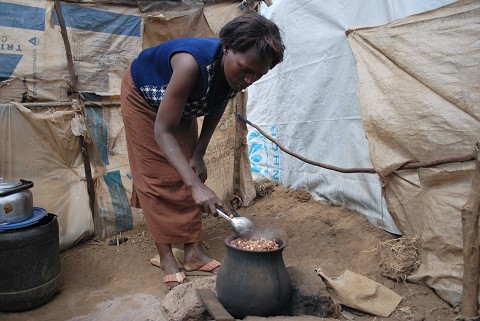Step Into the Life of One: Elizabeth Morrie
Edit
Food. A staple of life and
something most of us take for granted. Most of us are used to three
meals a day, snacks, and going out, sometimes just to get coffee or
sweet tea. While this is the case for us, most families in Camp Vision
are struggling to eat one meal a day. We are accustomed to readily
accessible food and drive thrus. People in Camp Vision have to walk a
long distance to the market because they lack access to transportation.
They attempt to grow their own crops but although most crops are easily
grown and tended elsewhere, they cannot afford the seeds to plant and
grow them. They also lack the water to tend and irrigate them, and the
money to purchase or rent the land on which to plant them. The problem
goes so much deeper than the fact that they do not eat on a regular
basis.
It begins with those who have been simply handing them bags of food for
the past three years. It is an attempt to fill their bellies but does
not address or make gains to solve the underlying problem. We want to
address the root of the need, the real problem, not just the symptoms.
Meet Elizabeth Wanja Morrie. This is her story. Her story shows the need
for a sustainable way to produce her own food and provide for herself
and her family. Elizabeth is a thirty-one year old single mother of four
children. She and her three boys and one girl have been living in Camp
Vision since the 2007 presidential election. Prior to the election, she
earned 50,000 Kenya shillings (ksh) a year (about $700) farming in her
hometown of Narok. Now if she is lucky, she can earn up to 300 ksh a
week (about $4) working random odd jobs. Sometimes her family eats one
meal a day. However, many days they do not eat at all.
Saving money to purchase land or hens and chickens for long-term food
supply is difficult because she is trying to provide food for her
children for today.
When Matt and Logan visited her tent, she was eating Githeri (beans and corn) and some cooked green  vegetable leaves. This is what she is cooking in the picture. Her
vegetable leaves. This is what she is cooking in the picture. Her
eldest three children were on a break from school but weren’t present
because they were out searching for food. Thankfully, Elizabeth has
somehow managed to afford to pay their school fees thus far, and they
have been attending school!
It is easy to see needs, but much more difficult to arrive at and
implement ideas for a solution. The existing need is for them to begin
eating now and to have resources to eat and provide food for their
families long-term, apart from any outside help or resources. Our ideas
to address this need do include meeting the immediate crisis, however on
the larger scale we hope they will reach a place of complete reliance
on themselves. We will accomplish this by providing them with start-up
capital, such as chickens, coops, and seeds, with the long-term goal
being that people will take ownership of producing their own food.
Can you picture the day when Elizabeth, her children, and her community
all have full bellies and know where their next meal is coming from?
Please dream and partner with us to help make this reality for them.








